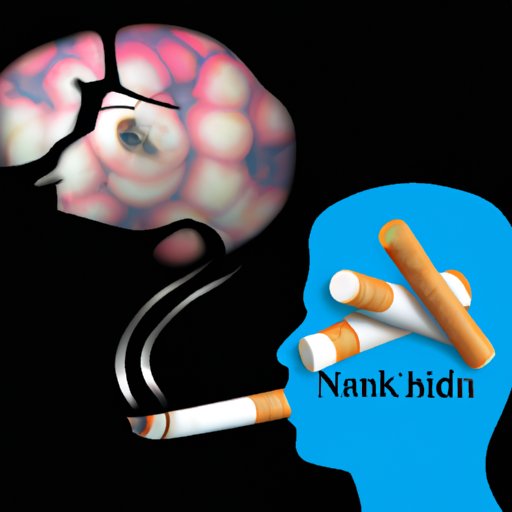Introduction
Nicotine is a highly addictive substance found in cigarettes, cigars, e-cigarettes, and other tobacco products. While many people may not realize it, nicotine is just as addictive as heroin or cocaine. Understanding how nicotine affects the brain and body, and how long it takes to become addicted to nicotine, is important for preventing nicotine addiction.
Exploring the Science Behind Nicotine Addiction
When nicotine enters the bloodstream, it travels to the brain where it binds to receptors that are responsible for releasing dopamine. Dopamine is a neurotransmitter that produces feelings of pleasure and reward. This reward system encourages users to continue using nicotine, eventually leading to dependence and addiction.
In addition to its effect on dopamine, nicotine also alters the release of other neurotransmitters such as serotonin, acetylcholine, and norepinephrine. These neurotransmitters play a key role in regulating mood, memory, concentration, and alertness. Over time, nicotine can change the way these neurotransmitters function, leading to an increased risk of depression, anxiety, and other mental health issues.

Examining How Long It Takes to Become Addicted to Nicotine
The amount of time it takes to become addicted to nicotine varies from person to person. Factors such as age, frequency of use, and individual biology can all influence the timeline of nicotine addiction. Some people can become addicted after just a few uses while others may take weeks or months to develop an addiction.
In addition to the timeline of addiction, there are also potential short-term effects of nicotine use. These include headaches, dizziness, nausea, and difficulty concentrating. Though these symptoms are usually mild, they can be uncomfortable and may cause users to seek relief by using nicotine again.
Understanding the Risks of Becoming Addicted to Nicotine
Nicotine addiction is associated with a number of health risks. Prolonged nicotine use can increase the risk of cancer, heart disease, stroke, and respiratory diseases. In addition, nicotine can have negative psychological effects such as anxiety, depression, and mood swings.
For pregnant women, nicotine can be particularly dangerous. Studies have shown that nicotine can increase the risk of miscarriage, preterm delivery, and low birth weight. It can also lead to babies being born with physical defects or learning disabilities.

Investigating the Effects of Nicotine on the Brain and Body
Nicotine has both short-term and long-term effects on the brain and body. In the short term, nicotine can cause impaired cognitive function, including memory problems and difficulty concentrating. Prolonged use of nicotine can lead to changes in brain structure, making it more difficult for users to quit.
In addition to its effects on the brain, nicotine can also have negative effects on physical health. Nicotine constricts blood vessels, leading to increased blood pressure and heart rate. It can also increase the risk of heart attack and stroke. Finally, nicotine can weaken the immune system, making it more difficult for the body to fight off infections.

Analyzing the Timeframe for Developing an Addiction to Nicotine
It is important to understand the factors that can increase the likelihood of nicotine addiction. Regular use of nicotine, even in small amounts, can quickly lead to dependence. In addition, certain genetic factors can make some individuals more susceptible to nicotine addiction than others.
There are also different types of nicotine addiction. Some people may become addicted to cigarettes, while others may become addicted to nicotine replacement therapies such as patches or gum. The type of nicotine addiction will also affect the timeline for developing an addiction.
Conclusion
In conclusion, nicotine is a highly addictive substance that can have serious consequences for the brain and body. Understanding the science behind nicotine addiction and examining how long it takes to become addicted to nicotine is essential for preventing nicotine addiction. Factors such as age, frequency of use, and individual biology can all influence the timeline of nicotine addiction. Finally, it is important to understand the risks associated with nicotine addiction, including health risks and psychological risks.
By educating yourself about the dangers of nicotine, you can make informed decisions about your own health and the health of those around you. If you or someone you know is struggling with nicotine addiction, reach out for help today.
(Note: Is this article not meeting your expectations? Do you have knowledge or insights to share? Unlock new opportunities and expand your reach by joining our authors team. Click Registration to join us and share your expertise with our readers.)
